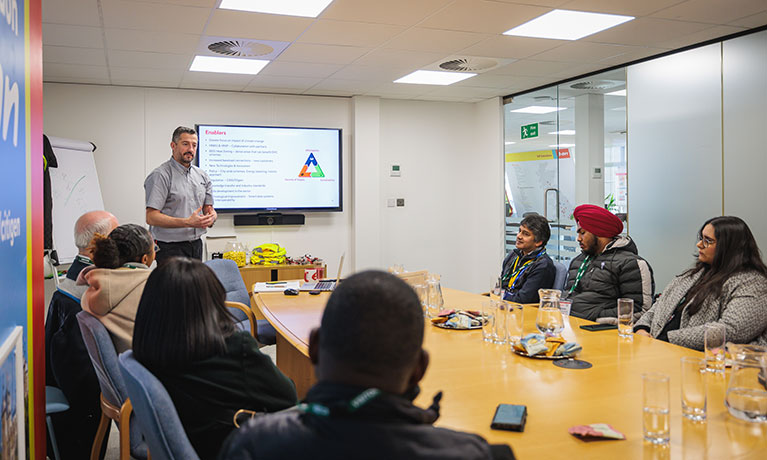Search
Energy Management BSc (Hons)
Study level: UndergraduateHNC/HND courses

The BSc (Hons) Energy Management degree course explores all aspects of the energy industry with a focus on sustainability throughout the course.
Course features
Year of entry
2026-27
Location
CU London (Greenwich, London)
Study mode
Full-time
Sandwich
Duration
4 years sandwich
3 year - Degree
2 year - HND
1 year - HNC
Course code
NH82
Start date
September 2026
November 2026
January 2027
March 2027
May 2027
July 2027
Course overview
You will examine oil and gas exploration and production, renewable energy production and the social and environmental impacts of these processes.
Course content and assessments have been designed to help you develop both theoretical knowledge and understanding, as well as practical skills to enhance your career and academic opportunities.
Climate change, and the need to make our energy sources as efficient as possible, is arguably one of the most important struggles faced by our generation. There has never been a more important time to understand energy.
Why you should study this course
- This course is ideal for you if you wish to explore all aspects of the energy industry.
Citigen Power Plant tour
CU London Energy Management students explore sustainable energy solutions as they speak to industry experts and gain real-life experiences as they discover how heat networks are powered at the Citigen Power Plant in Barbican, London.
What you'll study
Energy management is a varied and interesting topic to study, made extremely relevant by the growing importance of climate change.
Studying these subjects not only provides an exciting insight into what is considered a life-supporting area, but also develops key transferable communication, numerical, digital and time management skills.
We regularly review our course content, to make it relevant and current for the benefit of our students. For these reasons, course modules may be updated.
How you'll learn
This course is available as a full-time three-year or optional four-year sandwich course, the latter incorporating a work placement or study year in a related field2.
Our teaching methods are varied, offering a number of teaching styles to suit the needs of all our students, so in addition to lectures, we also utilise a blended learning approach, including online aspects, workshops and group work. Additional support is available via email and our online learning platform, which is currently Aula.
Progression through the modules develops knowledge and skills, including communication (written and oral), study skills, research methods, project management, presentation and career development. We will also encourage you to consider your employability and/or entrepreneurial development.
Unlike traditional institutions, there are no end of year exams. Instead, learning is assessed through coursework and phase tests, which is more reflective of our learning model.
Teaching contact hours
As a full-time undergraduate student, you will study modules totalling 120 credits each academic year. A typical 20 credit module requires a total of 200 hours study. This is made up of teaching contact hours, guided and independent study.
Teaching hours:
Teaching hours vary depending on year of study and due to module selection. During your first year you can expect 15-18 teaching hours each week. You will also have the option to attend optional sessions including time with a progress coach or to meet with staff for advice and feedback. As you progress through your studies, teaching hours may reduce.
Guided and independent study:
Throughout your studies, you will be expected to spend time in guided and independent study to make up the required study hours per module. You’ll be digging deeper into topics, review what you’ve learned and complete assignments. This can be completed around your personal commitments. As you progress through your studies, you’ll spend more time in independent study.
Online learning:
As an innovative university, we use different teaching methods including online tools and emerging technologies. So, some of your teaching hours and assessments may be delivered online.
Assessment
The learning outcomes of modules, assignments and projects will be clearly stated. Your work will be marked according to how well you achieve these learning outcomes and your final feedback will refer to each outcome, as well as providing an overall percentage grade.
This course will be assessed using a variety of methods which will vary depending upon the module.
Assessment methods may include: practical class and project performance, written practical reports, project thesis, laboratory experiments, tutorial tasks and assessments, which take place at the end of each six-week block.
Course breakdown:
- coursework
- presentations.
The Coventry University Group assessment strategy ensures that our courses are fairly assessed and allows us to monitor student progression towards achieving the intended learning outcomes.
Entry requirements
Typical entry requirements:
Fees and funding
| Student | Full-time | Part-time |
|---|---|---|
| UK, Ireland*, Channel Islands or Isle of Man | 2026/27 fees TBC 2025/26 fees: £9,535 per year |
Not available |
| EU | 2026/27 fees TBC 2025/26 fees: £9,535 per year with EU Support Bursary** 2026/27 fees TBC 2025/26 fees: £14,800 per year without EU Support Bursary** |
Not available |
| International | 2026/27 fees TBC 2025/26 fees: £14,800 per year |
Not available |
If you choose to study this course with a professional placement2 or study abroad year, you will need to pay a tuition fee3 to cover your academic support throughout your placement year. Students commencing their professional placement in the academic year 2027/28 will pay £1,500 if they are paying UK fees, or £1,800 if they are paying international fees.
For advice and guidance on tuition fees and student loans visit our undergraduate finance page and see the university’s Tuition Fee and Refund Terms and Conditions.
The University will charge the tuition fees that are stated in the above table for the first Academic Year of study. The University will review tuition fees each year. For UK (home) students, if Parliament permits an increase in tuition fees, the university may increase fees for each subsequent year of study in line with any such changes. Note that any increase is expected to be in line with inflation.
If you choose to study this course with a professional placement, the University will charge the tuition fees stated above for those on a placement during Academic Year 2027/28. The University will review professional placement tuition fees each year. For UK (home) students, the University may increase fees for each subsequent year of study, but such that it will be no more than 5% above inflation.
For international students, we may increase fees each year, but such increases will be no more than 5% above inflation. If you defer your course start date or have to extend your studies beyond the normal duration of the course (e.g. to repeat a year or resit examinations) the University reserves the right to charge you fees at a higher rate and/or in accordance with any legislative changes during the additional period of study.
We offer a range of international scholarships to students all over the world. For more information, visit our international scholarships page.
Tuition fees cover the cost of your teaching, assessments, facilities and support services. There may be additional costs not covered by this fee such as accommodation and living costs, recommended reading books, stationery, printing and re-assessments should you need them.
The following are additional costs not included in the tuition fees:
- Any optional overseas field trips or visits: £400+ per trip.
- Any costs associated with securing, attending or completing a placement (whether in the UK or abroad).
*Irish student fees
The rights of Irish residents to study in the UK are preserved under the Common Travel Area arrangement. If you are an Irish student and meet the residency criteria, you can study in England, pay the same level of tuition fees as English students and utilise the Tuition Fee Loan.
**EU Support Bursary
Following the UK's exit from the European Union, we are offering financial support to all eligible EU students who wish to study an undergraduate or a postgraduate degree with us full-time. This bursary will be used to offset the cost of your tuition fees to bring them in line with that of UK students. Students studying a degree with a foundation year with us are not eligible for the bursary.
Facilities
CU London Greenwich is located in Mitre Passage on the Greenwich Peninsula. The campus is easy to access by road, rail and bus. North Greenwich tube station (Jubilee Line) is just a three-minutes’ walk away.
Facilities are subject to availability. Access to some facilities (including some teaching and learning spaces) may vary from those advertised and/or may have reduced availability or restrictions where the university is following public authority guidance, decisions or orders.
Careers and opportunities
Upon successful completion of this course, you should know how to:
- analyse and learn about the mitigation of the environmental, political and social impacts of global energy production and consumption, including both academic theories and international standard procedures
- explore the flows of energy and matter in natural systems, and their role in supporting life and the nature, organisation, complexity, sustainability and interconnections of human systems globally
- apply economic concepts, principles and tools, and economic analysis of national and international oil, gas and energy institutions, processes and markets. Evaluate how economic factors impact energy policy for different global organisations and stakeholders
- evaluate the issues and techniques involved in collecting, analysing and communicating energy information, and developing research design and execution skills within research on energy-related academic topics.
The BSc (Hons) Energy Management degree aims to provide you with a mix of energy-specific and general management knowledge and skills. The course also includes sustainability and environmental issues within the oil, gas and renewable energy industries, so it's both current and forward looking in its approach regarding the diverse and changing energy landscape.
There are a variety of potential career opportunities both in the UK and internationally within organisations like national and international oil companies, government agencies, local government, and global consultancies. Also with the growth of sustainability across every sector this course opens up a wide variety of career opportunities. Career paths can include areas such as health and safety, sustainability and environmental advisers, carbon management, net zero consultant, project management and policy roles.










